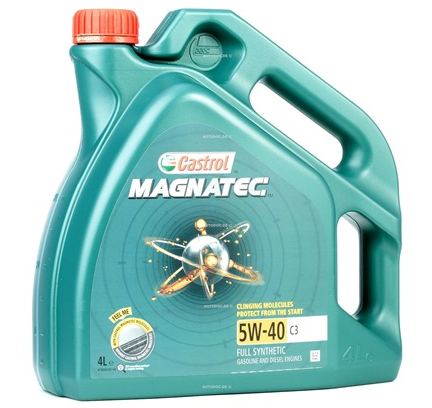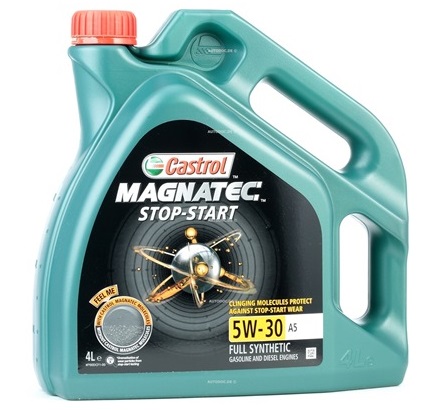Table of Contents
5w40 vs 5w30: What’s the Difference and Which one is better?
Lubrication system performance directly affects the engine's working lifespan. That is why many drivers wonder which oil viscosity they should prefer in order to ensure total reliable motor protection. Here we review the properties of the two most popular kinds of oil: 5w30 and 5w40, to find out which of them is the best for use.
5w30 vs 5w40: oil characteristics
When it comes to choosing the right engine oil, understanding the differences between 5w30 and 5w40 can make a significant impact on your vehicle's performance.
5w30 is ideal for operating temperatures ranging from -25°C to 25°C, while 5w40 extends its range slightly to -25°C to 35°C. This means that if you're driving in colder climates, 5w40 might offer better performance due to its ability to withstand lower temperatures.
5w30 operates effectively in temperatures from -25°C to 25°C, while 5w40 extends slightly to -25°C to 35°C. In colder climates, 5w40 may perform better due to its ability to withstand lower temperatures.
Ultimately, the choice between 5w30 and 5w40 depends on various factors such as your vehicle's specifications, typical driving conditions, and personal preferences.
Here are the characteristics of each oil type:
5w30:
- Kinematic viscosity: 9.3–12.5 mm²/s
- Dynamic viscosity: 2.9 mPas
- Suitable operating temperature range: -25°C to 25°C
- Excellent flow properties, particularly during cold starts
- Lighter weight, contributing to better fuel consumption
5w40:
- Kinematic viscosity: 12.5–16.3 mm²/s
- Dynamic viscosity: 3.5 mPas
- Suitable operating temperature range: -25°C to 35°C
- Maintains higher engine pressure, suitable for heavy loads or high temperatures
- Slightly heavier compared to 5w30, but still offers good flow properties
What's the difference between 5w30 and 5w40?
Whilst 5w40 oils are more effective at higher temperatures, withstanding ambient temperatures of up to 50°C compared to 30°C for 5w30 oils, both maintain a consistent viscosity for engine starting at -30°C and fluidity at -35°C. Each type of oil has distinct advantages and disadvantages.
5w40 oil forms a robust oil film that improves sealing ability and is suitable for the heavy loads commonly found in high-performance vehicles. However, it can lead to higher cranking resistance, which affects engine dynamics, and its wider temperature range correlates with a shorter life. Conversely, 5w30 oil offers better pumpability throughout the lubrication system, effectively cleaning engine parts, aiding cooling, and promoting fuel efficiency.
5w30 or 5w40: comparison table
| Characteristics | 5w30 Oil | 5w40 Oil |
| Temperature range | Optimal up to 30° ambient temperature | Effective up to 50° ambient temperature |
| Low-temperature performance | Maintains viscosity at -30°C, fluidity at -35°C | Maintains viscosity at -30°C, fluidity at -35°C |
| Advantages | Better pumpability through lubrication system, effective engine part cleaning, aids in cooling, promotes fuel efficiency | Forms thicker and stronger oil film, excellent gap sealing, suitable for heavy loads, commonly used in high-performance vehicles |
| Disadvantages | Increased friction couple gaps may result in oil seepage | Higher cranking resistance impacting motor dynamics, shorter lifespan due to broader temperature range |
5w40 vs 5w30: Which one is thicker?
Between 5w30 and 5w40 oils, 5w40 is usually thicker. This is because the first number (5w) represents the viscosity of the oil at cold temperatures, and both oils have the same viscosity at low temperatures (-30°C). The second number (40 for 5w40 and 30 for 5w30) indicates the viscosity of the oil at high temperatures.
A higher second number indicates a thicker oil, so 5w40 is thicker than 5w30 at higher temperatures. With a thicker oil film, 5W40 provides better gap sealing and is more effective at handling heavy loads.

5w30 vs 5w40: Which is better and how to choose?
Choose according to engine requirements. 5w30 offers better fuel economy and engine cleanliness. 5s40 provides a thicker oil film for high-performance engines.
Several factors, including engine type, climate and desired performance levels, determine the right choice of engine oil – be it 5w30 or 5w40. Here are some recommendations to help you make the right choice for your engine.
- If you use your vehicle in urban conditions, often sit in traffic jams, drive at high speeds, and your car is old, choose 5w40.
- If you prefer calm driving, and fuel economy and eco-friendliness are important to you – choose a product with a 5w30 label.
- Apart from viscosity, the following parameters should be taken into consideration when choosing a lubricant:
- Oil base composition. For some engines only synthetic oils are suitable, for others only mineral oils.
- API and ACEA classification. Even products with the same SAE viscosity grade can differ in the amount of additives, ash content and other parameters. These classification systems take all these differences into account.

Can you use 5w40 instead of 5w30 and vice versa?
Changing from 5w30 to 5w40 and vice versa is only possible if the vehicle manufacturer allows it. Otherwise, the engine may fail prematurely.

Conclusion
In the event of an emergency, it is possible to substitute 5w40 for 5w30 and vice versa. However, it is advisable to adhere to the recommendations of the vehicle manufacturer. The oil weight was selected by the manufacturer to optimise fuel efficiency and protection at different temperatures. It is also important to consider the climate.
5w40 offers thicker, high-temperature protection for hot areas, while 5w30 flows better for colder climates and improves fuel mileage. For high mileage engines, 5w40's slightly thicker consistency may help to reduce leaks. If you are unsure about the oil to use, please consult your owner's manual or a mechanic to choose the ideal oil for your car.
Top products related to this topic
- Engine oil for a Ford Fiesta
- Engine oil for a Ford Focus
- Engine oil for Hyundai i10
- Engine oil for Mercedes Sprinter
- Engine oil for Suzuki Swift
- Mobil engine oil 5w-30
- Engine oil for Citroen C4
- Oil for Vauxhall Crossland X

















